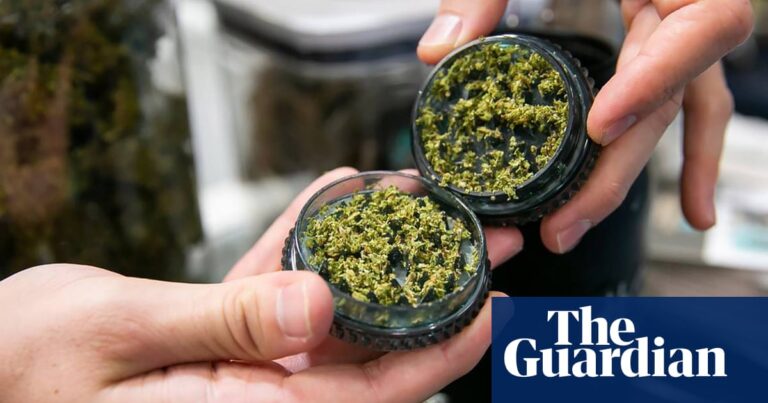At the Benzinga Cannabis Capital Conference held in downtown Chicago last week, it became clear that the industry is nervously awaiting legal vindication.
At first glance, it looked like any other business conference. Many men wore formal business suits, outnumbering women. There was no skunk smell in the exhibit hall, and free t-shirts and tote bags were easier to get than at the co-op store.
Many of the participants had backgrounds in the alcohol industry, medical industry, and law, and were familiar with the corporate culture before entering cannabis. Many CEOs of cannabis companies told the Guardian that they had never actually tried cannabis before working with it.
In between discussions about taxes and lobbying, panelists occasionally acknowledged the hundreds of thousands of people who are incarcerated for participating in the illegal cannabis industry, people who would never be able to attend a conference like this.
Most conversations revolved around the difficulty of maintaining a business in a legal gray area.
“Because our industry is new, our stock is risky by definition for investment purposes,” said Robert Beasley, CEO of Cansortium, a publicly traded cannabis company with operations in Florida, Pennsylvania and Texas. Stocks,” he said.
Beasley said “legislative events and political developments” affect Cansortium's stock price “more than anything we do as a company.”
Uncertain timelines for various legislative changes make it difficult for businesses to prepare for what's next.
One of the biggest topics discussed during the meeting was the planned change that would shift the legal status of cannabis from a dangerous and prohibited narcotic to a drug subject to FDA approval. Although this change does not have much of an impact on the legal status of recreational dispensaries or the products they sell, it can still dramatically impact their bottom line by allowing them to deduct business expenses.
Tax Law 280E specifically prohibits businesses from deducting the costs of trafficking illegal Schedule I substances, including marijuana. If the schedule changes, this rule would no longer apply to cannabis.
When the DEA announced in August that it would not hold hearings on rescheduling until after the election, cannabis advocates feared that President Trump's second term would kill the initiative.
In a session titled “Creating the Next Chapter: Congress' Role in Promoting Cannabis Reform,” David Mangone, vice president of the lobbying firm Liaison Group, said President Trump's efforts to legalize marijuana in Florida He suggested that the industry could feel safe going into the election because it publicly supported the ballot measure. .
In another session titled Consolidation Trends After Cannabis Rescheduling: Identifying Winners and Losers, panelists said the IRS could pursue allowing companies to deduct expenses as if the rescheduling had already occurred. We debated whether or not.
“It's unfortunate that it's so necessary to look for those kinds of loopholes in this industry, because if you don't you can't do business,” said AJ Jamil, who works at financial services firm Liveflow, adding that cannabis companies are trying to He added that there is. This is to avoid tax penalties by separating entities that “contact plants” from other parts of the business that do not come into contact with illegal substances.
“But the problem is that the IRS knows about this loophole and is going after people because of it,” Jamil said.
Exhibitors included companies such as a gummy maker and an ATM supplier.
The tricky legal status of cannabis also means that even for fully legal components of the industry, decisions can be influenced by unusual factors.
Brian Gerber, CEO of Hara Supply, which supplies pre-roll packaging and other smoking equipment, said he sometimes turns away potential customers because they ask for cash.
“They're actually angry about why they're not taking my cash, because they have a lot of cash sitting there and they need to figure out what to do with it,” he said. Ta.
Many cannabis businesses are sitting on excess cash because their illegal status makes it difficult to access banking services.
Changes in state policy could also cause headaches for the industry.
Dan Nguyen, a designer at The Packaging Company, which makes cannabis containers, said he sometimes has to design many versions of the same package to comply with various state regulations. Some require warning labels to appear on 30% of the design, while others prohibit colorful packaging.
Regulation has also created new areas of the industry. Brandi Young founded Certainty Labs after New York state legalized recreational marijuana. Her lab conducts legally required third-party testing to ensure cannabis products are accurately labeled in potency and free of excessive contaminants such as pesticides and heavy metals. We are doing
But the lab has faced criticism from industry and consumers alike, she says.
“Our regulators position us in the market as the industry police, but we are not,” she said.
Meanwhile, testing agencies have gotten a bad rap from consumers, especially after this summer's LA Times revelations that cannabis products contained pesticides and heavy metals that weren't listed in test reports. There is a possibility.
“Unfortunately, we see a lot of unscrupulous behavior in clinical testing, even though we are supposed to be the source of truth,” Young said.
Endangered cannabis businesses hope legalization efforts will bring safety, but legal legitimacy could come with new challenges, Gerber said.
“I think if the federal government wants to legalize it, they're only going to legalize it if they're making money, right?” he said, hinting that that would mean even more taxes. .

